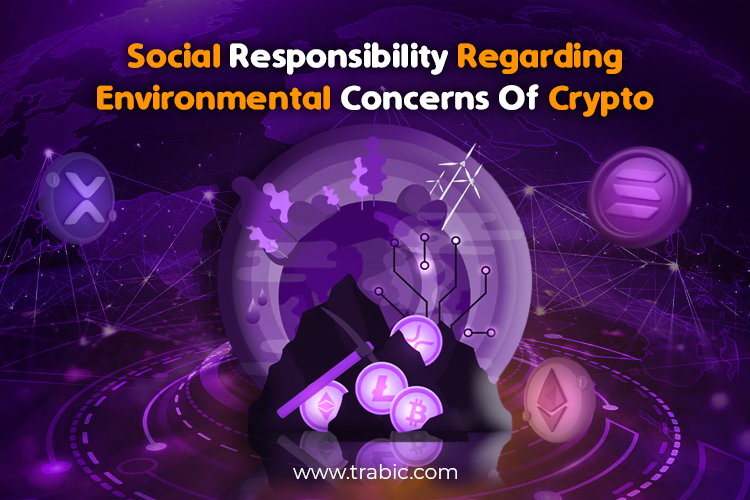The ethics of cryptocurrency is an important and complex topic that encompasses a range of issues, including environmental concerns and social responsibility. One of the primary environmental concerns associated with cryptocurrency is the energy consumption required for mining and processing transactions. Mining cryptocurrencies such as Bitcoin requires significant amounts of electricity, which can lead to a high carbon footprint and contribute to climate change.
This has advanced to criticism that cryptocurrencies are not environmentally sustainable and may negatively impact the environment. Some cryptocurrencies that use more energy-efficient mining algorithms or rely on alternative methods for processing transactions are being developed to address these concerns.
In addition, there is a growing movement in the crypto industry to shift to renewable energy sources, like wind or solar power, to power cryptocurrency mining and transaction processing. Social responsibility is another important consideration in the ethics of cryptocurrency. Cryptocurrencies can empower individuals and communities by providing access to financial services and enabling new forms of economic activity. However, there are also concerns that cryptocurrencies may be utilized for illegal activities like money laundering or financing terrorism.
To address these concerns, companies and individuals in the crypto industry must prioritize social responsibility by implementing effective anti-money laundering and know-your-customer procedures and operating with regulators and law enforcement agencies to discourage using cryptocurrencies for illegal activities.
In addition, the crypto industry can promote social responsibility by supporting initiatives that promote financial inclusion, such as providing access to financial services for underserved communities and supporting charitable causes. The ethics of cryptocurrency is an evolving and complex topic that requires ongoing discussion and debate. Industry participants, regulators, and policymakers must work together to address environmental concerns and promote social responsibility in the crypto industry.
What Are The Primary Environmental Concerns Associated With Cryptocurrency?

One of the primary environmental concerns associated with cryptocurrency is the significant energy consumption required for mining and processing transactions. Cryptocurrencies like Bitcoin are based on a decentralized ledger called a blockchain, which requires a network of computers to validate and process transactions. This process, known as mining, involves solving complicated mathematical equations to add further blocks to the blockchain and confirm transactions.
Mining cryptocurrencies requires significant computational power, which in turn requires much energy. The Bitcoin network alone uses more energy than many countries, with estimates suggesting that the total annual energy consumption of Bitcoin mining could be as high as that of a small country like Switzerland.
Most of this energy comes from non-renewable sources like coal and natural gas, which can direct to an increased carbon footprint and contribute to climate change. This has led to grievances that cryptocurrencies are not environmentally sustainable and may negatively impact the environment. Some cryptocurrencies that use more energy-efficient mining algorithms or rely on alternative methods for processing transactions are being developed to address these concerns.
In addition, there is a growing movement in the crypto industry to transition to renewable energy sources, like wind or solar power, to power cryptocurrency mining and transaction processing. Some companies and organizations are also exploring ways to capture excess heat generated by cryptocurrency mining and utilize it for other purposes, such as heating buildings or generating electricity.
The high energy consumption needed for crypto mining and transaction processing is a significant environmental concern that the industry and its participants must address. The crypto industry can help mitigate its environmental impact and promote sustainability by promoting renewable energy sources and developing more energy-efficient mining algorithms.
How To Tackle The Primary Environmental Concerns Associated With Cryptocurrency?

The crypto industry can help mitigate its environmental impact and promote sustainability by implementing these solutions. There are several ways to tackle the primary environmental concerns associated with cryptocurrency. Below are some potential solutions.
Promote The Use Of Renewable Energy Sources.
Enabling the usage of renewable energy sources is a crucial step in tackling the primary environmental concerns associated with cryptocurrency. The crypto industry can reduce its carbon footprint by promoting renewable energy sources and contributing to the transition to a more endurable energy system. Cryptocurrency companies and mining pools can promote renewable energy sources by funding renewable energy projects, collaborating with renewable energy companies, and offering incentives to miners who use renewable energy sources.
Cryptocurrency companies can set renewable energy targets, such as using 100% renewable energy for their operations or supporting renewable energy projects equivalent to their energy consumption. Cryptocurrency mining facilities can explore renewable energy solutions like solar, wind, and hydroelectric power. They can also explore using energy storage solutions to store excess renewable energy during peak mining. Cryptocurrency companies can work with renewable energy providers to develop solutions for the crypto industry. Cryptocurrency companies can purchase carbon offsets to mitigate the environmental impact of their operations and support renewable energy projects.
Develop More Energy-Efficient Mining Algorithms.
Developing more energy-efficient mining algorithms is another way to tackle the primary environmental concerns associated with cryptocurrency. By developing more energy-efficient mining algorithms, the crypto industry can significantly reduce its carbon footprint and contribute to a more sustainable energy system. Below are some examples of how this can be done. Transitioning to proof-of-stake (PoS) algorithms requires less computational power than proof-of-work (PoW) algorithms used by Bitcoin. PoS algorithms rely on the amount of cryptocurrency a user holds instead of computational power, making mining more energy-efficient.
Some cryptocurrencies are developing mining algorithms requiring less energy than traditional PoW algorithms. For example, the Chia Network uses a new consensus algorithm called proof of space and time (PoST), which relies on hard disk space rather than computational power. Cryptocurrency miners can upgrade their hardware and software to more energy-efficient models requiring less energy.
Cryptocurrency mining facilities can implement energy-saving measures, such as using cooling systems that consume less energy or optimizing their mining operations to reduce energy consumption. Some cryptocurrencies are exploring reducing the time it takes to confirm transactions, reducing the computational power needed to process transactions, and the associated energy consumption.
Cryptocurrencies have gained widespread popularity, with more people investing and transacting. However, as the use of cryptocurrencies increases, so does the concern over their environmental impact, particularly due to the energy-intensive mining process used to validate transactions on the blockchain. Developing more energy-efficient mining algorithms is one way to tackle the primary environmental concerns associated with cryptocurrency.
Mining creates new coins, and transactions are validated on a blockchain. To do this, miners use specialized computer hardware to solve complicated mathematical problems, which require considerable energy. The energy consumption associated with mining has been a growing concern, as it contributes to carbon emissions and exacerbates climate change.
The solution to this problem lies in developing more energy-efficient mining algorithms. Currently, most mining algorithms require considerable computational power, which translates to high energy consumption. However, new algorithms are being developed that require less computational power and thus consume less energy. These new algorithms are based on proof-of-stake (PoS) rather than the traditional proof-of-work (PoW) consensus mechanism.
PoS is a more energy-efficient consensus mechanism compared to PoW. Instead of needing miners to solve complicated mathematical problems, PoS selects a validator based on the number of coins they hold. Validators are chosen to validate a block and are required to place a stake in the network, which they lose if they try to cheat. This means that validators have a financial incentive to act honestly, and there is no need for the energy-intensive mining process.
Use Alternative Methods For Processing Transactions.
Using alternative methods for processing transactions is another way to tackle the primary environmental concerns associated with cryptocurrency. By using alternative methods for processing transactions, the crypto industry can reduce its energy consumption and contribute to a more sustainable energy system. Layer-2 scaling solutions like the Lightning Network can significantly reduce the computational power needed to process transactions. These solutions allow users to conduct off-chain transactions, which do not need the same energy consumption as on-chain transactions.
Cryptocurrency companies can promote off-chain transactions, significantly reducing the computational power needed to process transactions. Some cryptocurrencies are being developed with a focus on environmental sustainability. For example, SolarCoin is a cryptocurrency that rewards solar energy producers for the electricity they generate.
Cryptocurrency companies can adjust transaction fees to incentivize users to conduct transactions during off-peak hours when energy consumption is lower. Blockchain optimization can reduce the amount of computational power required to process transactions. For example, reducing the block size or the number of transactions per block can reduce energy consumption.
Encourage Responsible Mining Practices.
Encouraging responsible mining practices is another way to tackle the primary environmental concerns associated with cryptocurrency. The crypto industry can reduce its environmental impact and promote sustainability by encouraging responsible mining practices.
Cryptocurrency mining facilities can transition to utilizing renewable energy sources like wind, solar, or hydropower to power their operations. By using renewable energy sources, they can significantly reduce their carbon footprint. Mining facilities can optimize their operations to improve efficiency and reduce energy consumption.
For example, they can use more efficient cooling systems or operate at cooler temperatures. Cryptocurrency companies can purchase carbon offsets to neutralize their carbon footprint. Carbon offsets are credits generated by projects that reduce or avoid greenhouse gas emissions, such as reforestation or renewable energy projects.
Cryptocurrency companies can develop certification programs to encourage responsible mining practices. These programs can provide guidelines and standards for mining facilities to follow and provide incentives for those that meet the standards. Cryptocurrency companies can engage with local communities to ensure their mining operations are sustainable and have a minimal environmental impact.
Carbon Offsetting
Carbon offsetting is another way to tackle the primary environmental concerns associated with cryptocurrency. Carbon offsetting is a practice where companies or individuals compensate for their carbon emissions by funding projects that lower or terminate greenhouse gas emissions elsewhere.
Using offsetting carbon strategies, the crypto industry can offset carbon emissions and support sustainable projects while promoting environmental awareness and responsibility. Cryptocurrency companies can purchase carbon credits to offset their carbon emissions. Carbon credits are created by projects that reduce or avoid greenhouse gas emissions, such as reforestation or renewable energy projects.
Cryptocurrency companies can neutralize their carbon footprint and support sustainable projects by purchasing carbon credits. Cryptocurrency companies can donate some of their profits to environmental organizations that reduce greenhouse gas emissions or promote sustainable practices. Cryptocurrency companies can develop sustainable projects, such as renewable energy or reforestation, to offset carbon emissions.
By developing such projects, they can promote sustainability and reduce their environmental impact. Cryptocurrency companies can engage with stakeholders, such as customers, investors, and regulators, to promote sustainability and encourage responsible environmental practices. By raising attention to the environmental effect of cryptocurrency and promoting sustainable practices, they can decrease their carbon footprint and add to a more endurable future.
Collaboration With Environmental Organizations
Collaborating with environmental organizations is another way to tackle the primary environmental concerns associated with cryptocurrency. Environmental organizations have expertise in sustainability and can provide valuable insights into how the crypto industry can reduce its environmental impact.
Environmental organizations can work with the crypto industry to develop sustainability standards to guide mining operations and reduce environmental impact. These standards can be based on best practices for energy efficiency, responsible mining practices, and carbon offsets.
Environmental organizations can work with the crypto industry to advance the development of renewable energy sources, such as solar and wind power, to power mining operations. This can reduce the carbon footprint of cryptocurrency and promote sustainability.
Environmental organizations can help raise awareness about cryptocurrency’s environmental impact and promote sustainable practices. By educating stakeholders about the impact of cryptocurrency on the environment and the benefits of sustainable practices, they can encourage responsible behavior and reduce environmental harm.
Environmental organizations can encourage investors to prioritize sustainability when making investment decisions. This can incentivize the crypto industry to adopt more sustainable practices and broadly promote sustainability. By collaborating with environmental organizations, the crypto industry can leverage its expertise to promote sustainability and reduce environmental harm. Collaboration can help address cryptocurrency’s primary environmental concerns and promote a more sustainable future.
Social Responsibility Regarding Environmental Concerns Of Crypto

Social responsibility concerning the environmental concerns of cryptocurrency involves the ethical considerations and actions taken by individuals and organizations in the crypto industry to minimize their environmental impact and promote sustainability. As the environmental effect of cryptocurrency becomes more widely acknowledged, there is a growing recognition that social responsibility is a critical aspect of the industry’s sustainability efforts. One aspect of social responsibility in the crypto industry is transparency. Cryptocurrency companies and mining operations should be transparent about their environmental impact, energy usage, and carbon emissions.
This can help investors, consumers, and other stakeholders make educated decisions regarding the sustainability of their cryptocurrency investments. Another aspect of social responsibility is accountability. Cryptocurrency companies and mining operations should be held accountable for their environmental impact and should take steps to minimize that impact. This may include investing in renewable energy sources, using energy-efficient mining algorithms, and implementing responsible mining practices.
In addition to transparency and accountability, social responsibility in the crypto industry also involves collaboration and innovation. Collaboration with environmental organizations and other stakeholders can help to identify new opportunities for promoting sustainability and reducing the environmental impact of cryptocurrency.
Innovation in technology and mining algorithms can also be critical in reducing the energy usage and carbon emissions associated with cryptocurrency. Finally, social responsibility in the crypto industry also involves a commitment to education and awareness. By educating stakeholders about the environmental impact of cryptocurrency and the importance of sustainability, the industry can promote responsible behavior and encourage more sustainable practices.
Social responsibility for the environmental concerns of cryptocurrency involves transparency, accountability, collaboration, innovation, and education. By taking these actions, the crypto industry can minimize its environmental impact and promote sustainability while contributing to a more socially responsible future.
Despite this, Amazon’s recent embrace of NFTs (non-fungible tokens) marks a turning point for the digital art market, as the e-commerce giant aims to leverage this innovative technology to enable artists to monetize their work and connect with fans. However, this development has also raised questions about the environmental impact of NFTs and the social responsibility of corporations to address these concerns.
NFTs are unique digital assets. All NFTs are created using blockchain technology, which powers cryptocurrencies. While this technology enables the creation of digital art that can be traded like physical art, the process of creating NFTs is energy-intensive and can consume a significant amount of electricity.
The environmental impact of cryptocurrency and NFT mining has been widely documented. Some estimates suggest that the carbon footprint of Bitcoin mining alone is the counterpart to that of a small country. As such, companies like Amazon must take responsibility for the environmental impact of their NFT offerings and seek to minimize their carbon footprint.
There are several ways that companies can take social responsibility for their environmental impact, including the use of renewable energy sources to power their operations, implementing energy-efficient technologies, and offsetting their carbon emissions through the purchase of carbon credits. By taking these steps, companies can help mitigate the environmental impact of their operations and demonstrate their commitment to social responsibility.
While the emergence of NFTs has opened up new opportunities for artists and the digital art market, corporations like Amazon must take social responsibility for their environmental impact. By implementing sustainable practices and minimizing their carbon footprint, these companies can help ensure that the growth of the digital art market is not at the expense of the environment.
